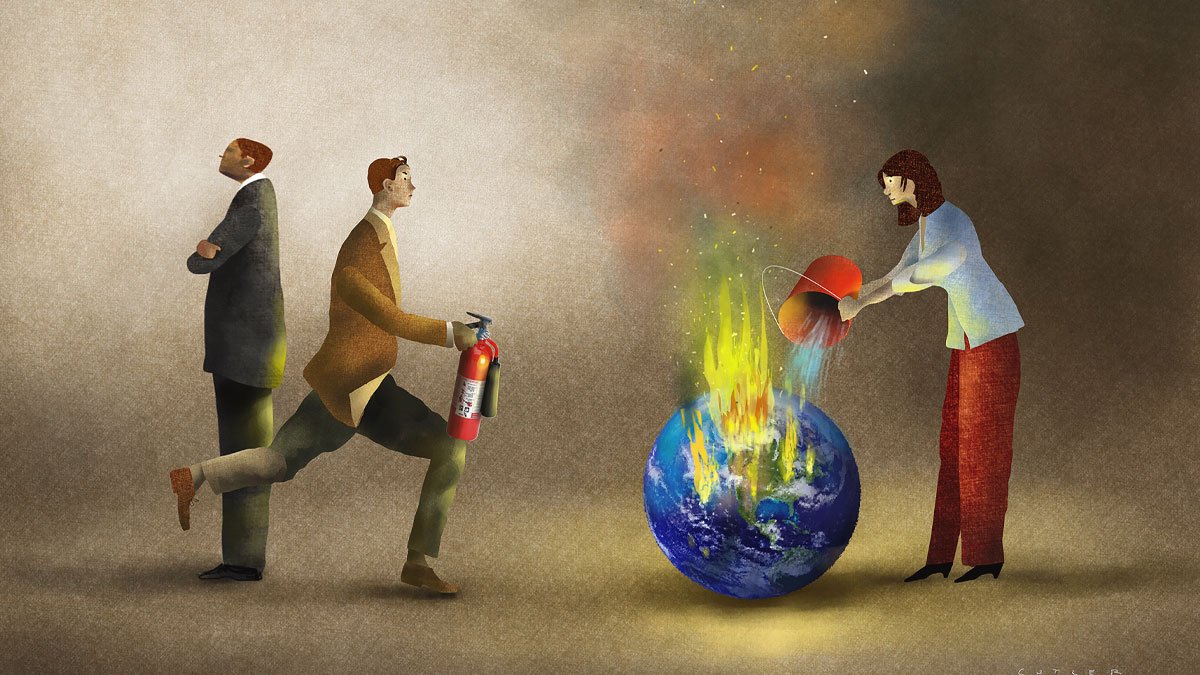Weekly The Generation, Year 1, Issue 14
December 05, 2023

By Rubaiya Hassan
In the grand tapestry of global issues, climate change often struggles to capture the attention it deserves. The unfortunate reality is that many people simply don’t care enough about the environment, believing that its deterioration is a distant concern that won’t touch their lives. However, the truth is stark and undeniable: Earth is our one and only home. There is no planet B, no escape hatch to a more forgiving habitat. If our planet suffers, so do we. The impact of climate change is not a vague future scenario; it is a pressing issue of today, and its consequences are more personal than we realize.
The disconnect between people and the urgency of climate change stems from a lack of personal connection to the issue. Earth, often taken for granted, is not just a place we inhabit – it is our singular abode, our sanctuary, and the source of our sustenance. Understanding this fundamental truth is crucial because, quite simply, if the Earth succumbs to the effects of climate change, we go down with it.
One of the primary reasons people remain indifferent to the climate crisis is the misconception that it’s a future problem. The reality is that climate change is not an abstract concern awaiting us in some distant tomorrow – it is already here, affecting us in tangible and immediate ways. From extreme weather events to rising sea levels, the impact of climate change is evident, and its consequences reverberate through our daily lives.
To break through this indifference, we must emphasize that the stakes are not only high but deeply personal. It’s not just about polar bears and disappearing ice caps; it’s about the air we breathe, the water we drink, and the food we eat. It’s about the health of our communities, the resilience of our economies, and the well-being of future generations.
The urgency of climate change demands a collective shift in mindset. We need to internalize the fact that our actions, no matter how small they may seem, have a direct impact on the health of our planet and, consequently, our own well-being. This understanding is the catalyst for change.
Every individual can become an environmental hero in their daily life. From transportation choices to dietary habits, from consumer decisions to community engagement, there are numerous avenues through which we can contribute to a sustainable future. It’s crucial to understand that the cumulative effect of seemingly minor decisions can lead to substantial environmental consequences. Take, for instance, our modes of transportation. Opting for public transit, carpooling, or even walking instead of driving alone significantly reduces carbon emissions. The choice to bike to work might seem trivial, but when multiplied across communities and nations, it becomes a powerful force for change.
Similarly, our dietary preferences play a pivotal role. Reducing meat consumption, particularly beef, lowers the demand for resource-intensive livestock farming. Embracing a plant-based diet, even if it’s just for a few meals each week, contributes to a significant reduction in greenhouse gas emissions and supports more sustainable agricultural practices.
Consumer choices, too, carry weight. Selecting products with minimal packaging, choosing energy-efficient appliances, and supporting companies committed to eco-friendly practices send a clear message to industries: sustainability matters. As consumers, our preferences shape markets, influencing businesses to adopt more environmentally responsible practices.
The path to combating climate change is not solely the responsibility of governments and industries; it begins with the choices each of us makes every day. Remember, there is no place else to go. Earth is our home, and it’s time for us to be its staunchest protectors.







